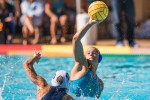Swim lanes were rolled up, water polo nets were flung into the pool and the local water polo club began warming up for practice.
Four-year-old Rachel Fattal floated amidst the activity, waiting for her parents to pick her up from a swimming lesson.
The curious kid drifted over to a clump of yellow Mikasa water polo balls and attempted to balance them on top of her head. Her hands were too small to grasp the ball and her arms not yet strong enough to throw it more than a couple feet.
Fattal, now an attacker for UCLA women’s water polo, no longer has any problem gripping a water polo ball, and no problem shooting past the top defenders in the country. Fifteen years of training and preparation propelled her into both the collegiate and international water polo spotlight.
“I think in sports you see it very often where someone is very talented but maybe doesn’t love the sport they play, or someone who works really hard but isn’t that talented,” said UCLA coach Brandon Brooks. “Rachel has a lot of key elements – she has the talent to be great, the competitiveness to set high goals and expectations and the work ethic to reach them.”
Fattal has always carried her strong work ethic and competitiveness in every aspect of her sporting career, which led her to take an Olympic redshirt year in 2016 and apply every effort to make the national team roster.
“I have never met anyone with more energy,” said senior defender Charlotte Pratt. “On our days off after tournaments, I would wake up to her coming back from a run or a swim. She never takes a single day off.”
Because of her young start, Fattal is accustomed to going the extra mile to improve her strengths and weaknesses, representing the USA since she was a mere teenager.
Fattal entered what is known as the “Olympic Pipeline” in water polo at a young age. It is the gateway to the Olympics – a status that most young athletes aspire toward, but only a few can reach. Young players are invited to join national teams early in their careers. Since she was 14 years old, Fattal was in the pipeline, joining the ranks of the youth team, junior team and now the senior national team.
“I’ve always had the dream of being on the national team – I’ve always wanted to pursue my dream more than thinking that ‘Oh, this could be my thing,’” Fattal said. “I always knew that that was the end result of whatever I wanted to do.”
The current national team spends an average day training for six and half hours. The long days, intensive training and preparation over the course of the year all went into the FINA Women’s Intercontinental Tournament in Lewisville, Texas and the upcoming qualifications.
“Everyone that is the best at the college level is most likely going to be on an international team,” Fattal said. “For other countries, it’s going to be the best players that they have. It’s going to be faster, everyone’s going to be just as good as you and just as fast as you.”
***
The sound of a cheering crowd and the steady drum roll of a high school band welcomed the team to Texas where the women were greeted with lines of fans. The arrivals terminal at Dallas/Fort Worth International Airport was packed with an enthusiastic welcoming committee that rivaled any crowd that the national team had previously experienced.
“It was absolutely amazing,” Fattal said. “We’ve never ever had that. We are a California-based team, and water polo is huge in California and we have never ever had that. And it was so unreal and so unexpected.”
As Fattal weaved her way through the lines of fans, young aspiring water polo players bombarded Fattal with pictures and T-shirts for her to autograph – a novel experience for the national team attacker.
“I’m not famous, I just play water polo. This is just what I have done my whole life,” Fattal said. “It’s incredible when someone looks up to you the way that these kids looked up to us in Texas.”
The fan base last month in Texas was huge for Fattal and the national team. The stands were packed every night for all six games in the FINA tournament, cheering on the U.S. National team. The senior team went on to sweep the tournament in Texas and moved on to the Olympic Qualification Tournament.
“The Olympics … it is like nothing else. It is the world’s highest level,” Brooks said. “You mix the intense competition of trying to be one of the 13 best at your sport in the entire country, which is a really cool thing to think that someone feels that they’re going to be one of … the very top athletes in the country or the world.”
International qualifiers for the Olympics are only a few weeks away and Fattal can feel the anticipation for Rio 2016 growing stronger.
“Hopefully if we qualify and I let myself start thinking about Rio, I’m sure it’s going to be crazy and I am going to be super excited,” Fattal said. “This was in my dreams for many years now. It was always ‘2016 2016 Rio here we go’ so I can only guess how excited I’m going to be.”
Although water polo has evolved for Fattal from a new and exciting hobby as a 4-year-old to a job that demands constant attention as a 22-year-old, she has always maintained the outlook that water polo should be fun.
“We do what we do because we love it and because we have fun doing it,” Fattal said. “And that’s the most important thing about any sport. … Yes, it’s my job. Yeah, it might suck at times, but at the end of the day I love playing water polo.”
